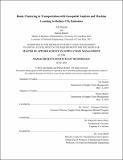Route Clustering in Transportation with Geospatial Analysis and Machine Learning to Reduce CO2 Emissions
Author(s)
Barkah, Ade; Robert, Patrick
DownloadBarkah_Robert_2018_Capstone.pdf (12.90Mb)
Metadata
Show full item recordAbstract
The transportation sector is a significant contributor to greenhouse gas emissions; hence, it is desirable to lower carbon emissions from this sector, especially with the expected growth in transportation needs from e-commerce. Since a particular vehicle type may exhibit different emissions characteristics when operating in different regions, determining which vehicle types should serve each region is an important consideration. This project assesses carbon emissions and fuel efficiency characteristics of delivery trucks in the fleet for one of the largest retail companies in Mexico: Coppel1. Coppel’s fleet consists of a number of truck types operating in diverse geographies throughout Mexico, making it difficult to make “apples-to-apples” comparisons of their performance. We apply machine learning to cluster routes using GPS traces from Coppel’s trucks and examine their performance in varying road and traffic conditions. We group the company’s routes into four different clusters based on factors such as road elevation, road gradients, average vehicle speed and the length between delivery stops. Furthermore, by considering vehicle weight utilization (i.e. load), we find a cluster of routes associated with increased fuel consumption and carbon emissions. We also rank the most efficient vehicles for each cluster. These results can inform route assignments to minimize fuel consumption and in planning of Coppel’s future fleet composition. We estimate that by operating the most efficient vehicle type at each cluster we could reduce vehicle fuel consumption by up to 7.2%. Finally, by reducing fuel consumption, we also limit the release of CO2 emissions to the environment.